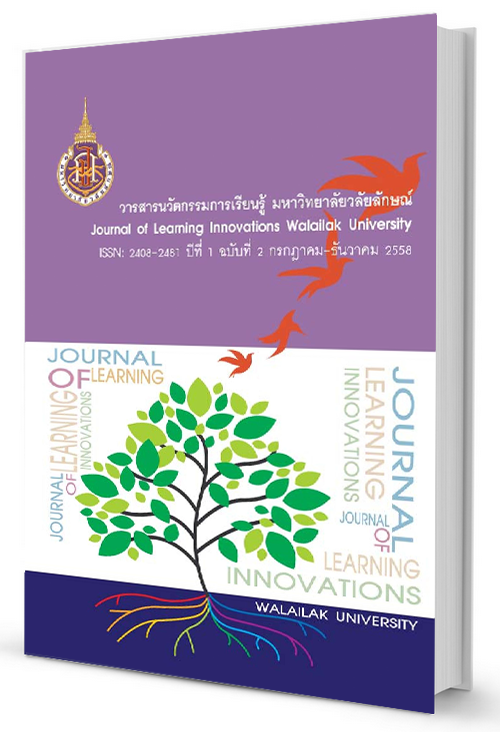The Integrated Learning Process of Problem-based Learning and Contemplative Study in the Course of Humanity Life and Self Development
DOI:
https://doi.org/10.14456/jli.2015.8Keywords:
กระบวนการเรียนรู้โดยใช้ปัญหาเป็นฐาน, จิตตปัญญาศึกษา, รายวิชา มนุษยภาพ, ชีวิตและการพัฒนาตนเอง, Problem-based Learning, Contemplative Study and the course of Humanity Life and Self DevelopmentAbstract
The curriculum development of the School of Liberal Arts, Humanity Life and Self Development was modified and integrated with the learning process of problem-based learning and contemplative study in 2009. The objectives of general education are broad, but the mosh essential is to produce an educated person. The syllabus aims at cultivating a learned person, a graduate who has acquired basic social and human skills necessary for living and working normally in a rapidly changing world. These include a cultivation of human qualities, such as curiosity for knowledge, passion for learning, creativity and imagination, communication skills and problem-solving competencies, critical and scientific mind, and public awareness, moral and ethical principles. The contemplative study of the course focuses on practical activities. It makes students take an active, task-oriented, art therapy, dialogue and self-directed approach to their own learning. Adaptation of the instructional approach that uses “real-world” and students’ experience helps them to learn critical thinking, problem-solving skills and public awareness. It also helps them to acquire a core understanding of the concepts of the course. There is no right or wrong answer as there are reasonable solutions based on application of knowledge and skills deemed necessary to address the issues.
This paper focuses on the critiques of integrating these two learning processes, which influence student learning of their own understanding of individuals and society. The learning process and the process of lifelong learning will be used to develop active learning for the General Education Program.
References
มหาวิทยาลัยวลัยลักษณ์. (2553). แผนยุทธศาสตร์มหาวิทยาลัยวลัยลักษณ์ พ.ศ.2553-2557 ฉบับปรับปรุงครั้งที่ 2. นครศรีธรรมราช: มหาวิทยาลัยวลัยลักษณ์.
มหาวิทยาลัยวลัยลักษณ์. (2557. คู่มือนักศึกษามหาวิทยาลัยวลัยลักษณ์ ระดับปริญญาตรี ประจำปีการสืกษา 2557. นครศรีธรรมราช: มหาวิทยาลัยวลัยลักษณ์.
ส่วนกิจการนักศึกษา. (2557). เอกสาร รายงานสรุปประเมินผลโครงการพัฒนาศักยภาพ นักสืกษา: กิจกรรม Be myself. นครศรีธรรมราช: ส่วนกิจการนักศึกษา มหาวิทยาลัยวลัยลักษณ์.
สิริพร สมบูรณ์บูรณ์. (2556). PBL: โจทย์ปัญหาหรือสร้างปัญหาทางสังคมศาสตร์.วารสารสังคมศาสตร์มหาวิทยาลัยวลัยลักษณ์, 6(6), 81-115.
อนุพันธุ์ พฤกษ์พันธ์ขจี. (2551). ศิลปะบำบัด...คืนความสมดุลสู่ชีวิต ความเข้าใจของ การวาดภาพระบายสี เพื่อการบำบัดบนพื้นฐานแนวคิดมบุษยปรัชญา. ใน จิตตปัญญาศึกษา: การศึกษาเพื่อการพัฒนามนุษย์ นครปฐม: โครงการ จิตตปีญญาศึกษา มหาวิทยาลัยมหิดล.
อัญชลี ชยานุวัขร. (2554). การเรียนรู้แบบใช้ปัญหาเป็นฐาน เล่ม 1 แนวคิดและ กระบวนการเรียนรู้ นครศรีธรรมราช: มหาวิทยาลัยวลัยลักษณ์.
เอกรัตน์ รวยรวย และคณะ. (2557). การเผยแพร่องค์ความเด้านจิตตปัญญาศึกษาใน มหาวิทยาลัยเทคโนโลยีพระจอมเกล้าธนบุรี (มจธ.). ใน จิตตปัญญาศึกษา... พลังแห่งการฟ้นฟูและสร้างสรรค์ทางสังคม นครปฐม: ศูนย์จิตตปัญญาศึกษา มหาวิทยาลัยมหิดล.
Boud, D. J. & Feletti, G. (Eds). (1991). The challenge of problem based learning. London: Kogan Page.
Boud, D. J. (1985). Problem-based learning in perspective, in Boud D. J.(Ed.). Problem-based learning in education for the professions.Sydney: Eligher Education Research and Development Society of Australasia.
Boudourides, M A. (1998). Constructivism and Education: A Shopper’s Guide.Contributed Paper at the International Conference on the Teaching of Mathematics Samos, Greece, July 3-6. Retrieved from https://vwvw.math.upatras.gr/ -mboudour/articles/constr.html
Brown, J. S., Collins, A., & Duguid, p. (1989). Situated cognition and the culture of learning. Educational Researcher, 18(1), 32-42.
Burch, K. (1999). A Primer on Problem-Based Learning: Examples from International Relations Courses. A sample of University of Delaware, 8(2). Retrieved from https://www.ntlf.com/html/lib/suppmat/ 82pblprimer.htm
Burch, K. (2001). PBL, Politics, and Democracy. In Duch, B. J., Groh, S. E. & Allen, D. E. (Eds). The Power of Problem-Based Learning Virginia: Stylus Publishing.
Duch, B.J., Groh, S E., & Allen, D E. (Eds.). (2001). The power of problem-based learning. Virginia: Stylus Publishing.
Evensen, D. & Hmelo, c. E. (Eds). (2000). Problem-based learning a research perspective on learning interactions. NJ: Lawrence Erlbaum Associates Publishers.
Gallow, De. (2000). What is problem-based learning?. Irvine Problem- based Learning Faculty Institute, University of California. Retrieved from https://vvvvw.pbLuci.edu/ winter2000/pblproblems.html
Geetz, c. (1973). The interpretation of cultures: Selected essays. NewYork: Basic Books.
Kolb, D. (1984). Experiential learning: Experience as the source of learning and development. Englewood Cliffs, NJ.: Prentice Hall.
Knight, p. T. & Trawler, p. R. (2000). Department-level Cultures and the Improvement of Learning and Teaching. Studies in Higher Education, 25(1), 69-83.
Leroy, p., Ligthart, S., & Bosch, H. van den. (2001). The role of project- based learning in the "Political and Social Sciences of the Environment" curriculum at Nijmegen University". International Journal of Sustainability in Higher Education, 2(1), 8-20.
Mackinnon, J. (2006). Problem based learning and New Zealand legal education. Web Journal of Current Legal Issues, (3). Retrieved from https://hdl.handle.net/10289/550
Marzano, R. J. & Kendall, J. S. (2007). The New taxanomy of educational objectives. California: Corwin Press.
Savery, Jr. & Duffy, T. M. (1996). Problem Based Learning: An Instructional Model and Its Constructivist Framework. In Wilson, B. G. (ed.). Constructivist learning environment: Case studies in instructional design (pp. 135-148). New Jersey: Educational Technology Publication. Retrieved from https://www.uakron.edu/edfound/people/saver/ papers/sav-duff.html
Schmidt. H.G. (1993). Foundations of Problem-based Learning: Some Explanatory Notes. Medical Education, (27), 422-432.
Trigwell, K. & Prosser, M. (1996). Changing approaches to teaching. Studies in Higher Education, 21(3), 282.
Tseelon, E. (2003). Difference between tradition learning and PBL.: Problem based learning. Belfield, Dublin: Dept, of Sociology, UCD.
Winch, p. (1990). The idea of a social science and its relation to philosophy. Great Britain: Routledge & Kegan.
Downloads
How to Cite
Issue
Section
License
เนื้อหาและข้อมูลในบทความที่ลงตีพิมพ์ในวารสารนวัตกรรมการเรียนรู้ มหาวิทยาลัยวลัยลักษณ์ ถือเป็นข้อคิดเห็นและความรับผิดชอบของผู้เขียนบทความโดยตรง ซึ่งกองบรรณาธิการวารสาร ไม่จำเป็นต้องเห็นด้วย หรือร่วมรับผิดชอบใดๆ
บทความ ข้อมูล เนื้อหา รูปภาพ ฯลฯ ที่ได้รับการตีพิมพ์ในวารสารนวัตกรรมการเรียนรู้ มหาวิทยาลัยวลัยลักษณ์ ถือเป็นลิขสิทธิ์ของวารสารนวัตกรรมการเรียนรุ้ มหาวิทยาลัยวลัยลักษณ์ หากบุคคลหรือหน่วยงานใดต้องการนำทั้งหมดหรือส่วนหนึ่งส่วนใดไปเผยแพร่ต่อเพื่อกระทำการใดๆ จ้อต้องได้รับอนุญาตเป็นลายลักษณ์อักษรจากวารสารนวัตกรรมการเรียนรู้ มหาวิทยาลัยวลัยลักษณ์ก่อนเท่านั้น


